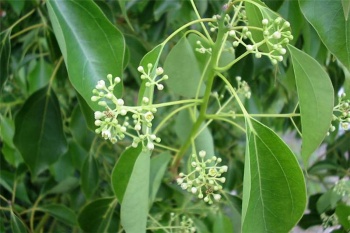Difference between revisions of "Ho Leaf"
From Wikiwel
(Created page with "See also : * Camphor * Ravintsara ==Special Precautions of Cinnamomum Camphora== ==Health Benefits and uses of Cinnamomum Camphora are== == References == [[Category:Treat...") |
|||
| (6 intermediate revisions by the same user not shown) | |||
| Line 1: | Line 1: | ||
| − | + | [[File:Ho leaf.jpg|thumb|Alt=Cinnamomum camphora|350px|left|Cinnamomum camphora]] | |
| − | + | Other names : Ho Leaf Oil, Ravintsara | |
| − | + | ==Special Precautions of Ho Leaf== | |
| − | ==Special Precautions of | + | * Do not confuse with [[Ravensara]] Oil or [[Ho Wood]] Oil. |
| − | ==Health Benefits and uses of | + | * Ho leaf might be UNSAFE when used long-term. It contains estragole, a chemical that might increase the risk of getting liver cancer. |
| + | * Use Ho leaf Oil sparingly and with caution. High doses may be carcinogenic because it contains a significant amount estragole (methyl chavicol) . Tisserand and Young suggest a dermal maximum of 15% if the estragole content does not exceed 0.8%. | ||
| + | * Pregnancy and breast-feeding: It’s best to avoid use. During breast-feeding, Ho leaf is POSSIBLY UNSAFE. Ho leaf contains a chemical, estragole, which has caused liver cancer in laboratory mice. | ||
| + | * Children: larger medicinal amounts might be UNSAFE. Ho leaf contains a chemical, estragole, which has caused liver cancer in laboratory mice. | ||
| + | * Tisserand and Young remind that "essential oils high in 1,8-cineole can cause CNS [central nervous system] and breathing problems in young children." They also caution not to use topically near the face of babies and children | ||
| + | * See precautions [[Aromatherapy]] | ||
| + | |||
| + | ==Health Benefits and uses of Ho Leaf are== | ||
| + | Influenza, Shingles, Supports the Immune System, Stress, Depression, Calms the Nerves, Promotes Sleep, Muscular Aches and Pains. | ||
== References == | == References == | ||
| + | ''Robert Tisserand and Rodney Young, Essential Oil Safety (Second Edition. United Kingdom: Churchill Livingstone Elsevier, 2014), 304.'' | ||
| + | |||
| + | |||
[[Category:Treatments]] | [[Category:Treatments]] | ||
| − | [[Category: | + | [[Category:Aromatherapy]] |
| + | [[Category:Essential oil]] | ||
| + | [[Category:Antirheumatic]] | ||
Latest revision as of 03:57, 31 December 2019
Other names : Ho Leaf Oil, Ravintsara
Special Precautions of Ho Leaf
- Do not confuse with Ravensara Oil or Ho Wood Oil.
- Ho leaf might be UNSAFE when used long-term. It contains estragole, a chemical that might increase the risk of getting liver cancer.
- Use Ho leaf Oil sparingly and with caution. High doses may be carcinogenic because it contains a significant amount estragole (methyl chavicol) . Tisserand and Young suggest a dermal maximum of 15% if the estragole content does not exceed 0.8%.
- Pregnancy and breast-feeding: It’s best to avoid use. During breast-feeding, Ho leaf is POSSIBLY UNSAFE. Ho leaf contains a chemical, estragole, which has caused liver cancer in laboratory mice.
- Children: larger medicinal amounts might be UNSAFE. Ho leaf contains a chemical, estragole, which has caused liver cancer in laboratory mice.
- Tisserand and Young remind that "essential oils high in 1,8-cineole can cause CNS [central nervous system] and breathing problems in young children." They also caution not to use topically near the face of babies and children
- See precautions Aromatherapy
Health Benefits and uses of Ho Leaf are
Influenza, Shingles, Supports the Immune System, Stress, Depression, Calms the Nerves, Promotes Sleep, Muscular Aches and Pains.
References
Robert Tisserand and Rodney Young, Essential Oil Safety (Second Edition. United Kingdom: Churchill Livingstone Elsevier, 2014), 304.
